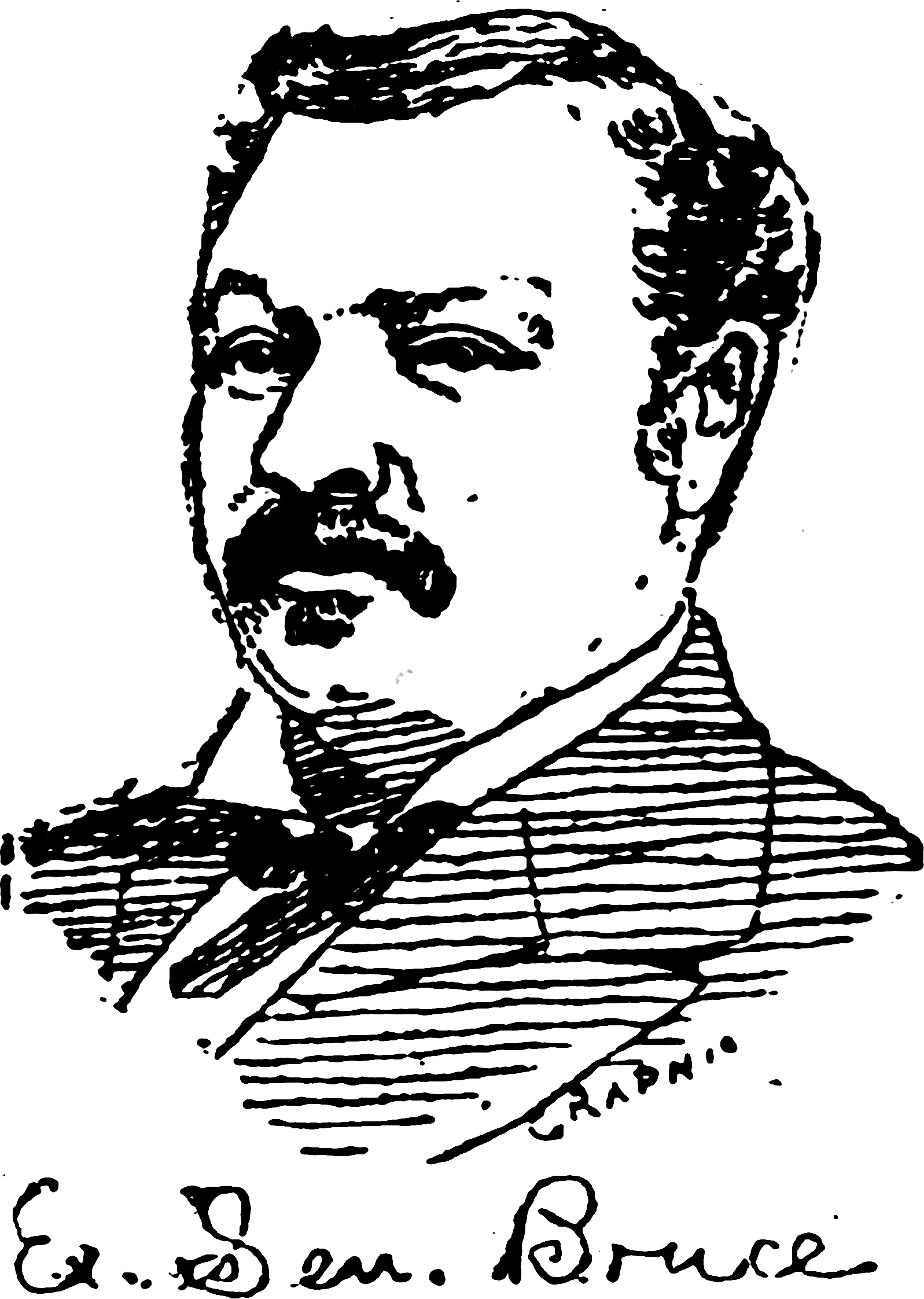The Saint Paul Daily Globe: Sunday Morning, July 31, 1887.
A Noted Colored Man.
Interesting Facts in the Life of the Hon. Blanche K. Bruce,
Ex-Senator from Mississippi.
While on His Visit to St. Paul He Relates Why He Bears His Peculiar Name.
How He Became Acquainted With Conkling on His First Day
A Graceful Orator and a Man of Plain Sense Working in Behalf of His Race.
Hon. Blanche K. Bruce, ex-senator from the state of Mississippi and a representative colored man in every sense of the word, who spoke at Mahtomedi last Friday, has been delighting lyceum audiences throughout the United States ever since he surrendered his position of register of the treasury to General W. S. Rosecrans, three months after the inauguration of President Cleveland. His style of delivery is very pleasing, being free from rant, and unimpassioned even when discussing his hobby, “The Race Problem.” which is making him more famous than ever before in his history.

There is an earnestness about the speaker, however, that carries conviction to the audiences whom he addresses, and he never appeals to party prejudices by interpolating politics into his lectures, but is satisfied with a calm presentation of facts. Unlike many platform orators he disdains claptrap and thundering accent, but with crossed hands, only varying the monotony with graceful gesticulations as he seeks to impress a good point, he does his talking.
It was forty-six years ago the first of March, 1841, when he was born and received the singular name which he has clung to although frequently importuned to change it to something that had more of the ring of masculinity about it. An old friend of his mother's was visiting the family prior to his appearance in this mundane sphere, and as her name was Blanche, it was decided that the baby should he called after her. Contrary to expectation, however, it was a boy child, but Mrs. Bruce persisted in her determination and named it Blanche.
“I have been tempted frequently to drop the final c,” said the lecturer in discussing the matter with a representative of the Globe, “but eventually I came to the conclusion that I had made my reputation as Blanche K. Bruce and hence would stick to the name until I died.”
HIS APPEARANCE.
Personally the ex-senator is a heavy set individual, weighing 210 pounds, and his face is adorned with a carefully trained moustache, a slight whisker under the lower lip and a suggestion of a side-whisker on each cheek. His face is a pleasant one and betokens the goodnatured, cultivated, intelligent man that the ex-senator really is, and in conversation his manner is most engaging and entertaining. Before his entrance into the United States senate in 1855, he was sheriff of Bolivar county. Mississippi, resigned this office to go into the national legislature, and previously be had served as superintendent of public instruction of the state and was one of the commissioners of levees along the Mississippi river contiguous to the portion of the South in which lie lived. The day that he was sworn in as a United States senator he became acquainted with Hon. Roscoe Conkling, and was always afterward an ardent admirer of that stalwart Republican, and his only child, now about eight years old, bears the name of Roscoe Conkling Bruce.
The acquaintance was brought about in this way: lt was customary when a junior senator, that is the latest one elected from a state, makes his appearance to be sworn in, for him to be escorted to the vice president's table by his colleague and in this instance it was the duty of Hon. James L. Alcorn, of Mississippi, who had been elected by the same legislature that sent Mr. Bruce to Washington, to perform his part in the ceremony. But apparently engrossed in his newspaper, Senator Alcorn allowed his colored colleague to thread his way down the aisle to the presiding officer's table for, as he after wards expressed it, he did not want to be a party to the proceeeding. While the new senator was subscribing his name in the book at the secretary's table
SENATOR CONKLING ENTERED
the senate chamber and took in the situation at a glance. Without hesitating a moment he advanced to the side of Senator Bruce, and passing his arm through one of the new senator's he escorted him hack to his seat and engaged in a few minutes' friendly chat. Subsequently he took particular pains with his protege, as Senator Bruce was afterwards called, and initiated him in the mysteries of legislative business, and took particular pains to have him placed with the most influential committees. In many other ways he manifested his friendliness for this representative colored man, and it is little wonder that Senator Bruce was among the most enthusiastic adherents and continues so to this day of the Utica statesman.
When President Garfield was inaugurated the 4th of March, 1881, the term of Senator Bruce expired and the Republican leader acknowledged his appreciation of the campaign work of the ex-senator by making him register of the United States treasury department. This position he held through the administration of President Arthur, and for three months under President Cleveland, finally relinquishing it as already stated, to Gen. W. G. Rosecrans, the incumbent. For the past two years the ex-senator has been lecturing in various parts of the country, principally the West, placing before the people the needs of the South for a better system of educational advantages as the only solution of a vexatious and soul-wearing problem.
A Noted Colored Man, The St. Paul Daily Globe, Saint Paul, Minn., Vol. IX, No. 212, Sunday Morning, July 31, 1887, Page 8. (PDF)